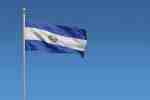3
Dichos de un Bicho
Cartoonist Victor Interiano, aka Dichos de un Bicho, uses satirical cartoons and Púchica Puchín memes to call out white supremacy, the Mexican hegemony, good ol’ white liberals, cishet activist men, and many other types of bayuncadas that sometimes go unchecked. When he is not critiquing systems of power and their beneficiaries, he is creating a dictionary of Salvadoran caliches (Salvadoran sayings and slang) or working on a cartoon series of flora and fauna in Central America.
What does it mean to be Salvadoran in the US?
My feelings about being Salvadoran in the U.S. are very much marked by my experience growing up during Reagan’s America in the 1980s. Every morning at school meant being forced to do the Pledge of Allegiance while staring at the portrait of Reagan, almost as if praying to a saint, all the while his administration was training and arming the Salvadoran military to kill my own people. At the same time, through a sort of cultural osmosis, “America” as an idea was fomenting a civil war inside me as a young person, arming a burgeoning American patriot with a sense of superiority whose orders were to destroy the Salvadoran in me. All this conflict to become a “Salvadoran-American,” a creature with a brown face that spoke like a white man.
At the same time as I was trying to navigate through my identity crisis brought on by the hegemonic tidal wave of whiteness, growing up as a Salvi kid in 1980s Los Angeles meant I was also subjected to a secondary cultural force of nature: the Mexican hegemony. What made conditions intolerable as a young Salvadoran were the passively xenophobic stares of puzzlement my parents would get from Mexicans in our neighborhoods. These microaggressions at the adult level then filtered down to their children and transform into the violence and bullying I endured from Mexican kids who would beat me up for saying the word “gaseosa.” I think that I have described the whole experience as drowning in a sea of competing hegemonies.
How do you use your art as a way of creating the Salvadoran diasporic identity?
The art I tend to create is polarized almost to a ridiculous degree. My political art as it relates to existence in the U.S. is hypercritical of and wrathful toward all systems of power, institutions, ideologies. But the sentimental art I create about El Salvador, my parents, and Central America as a whole is imbued with almost a childlike reverence; it’s funny, compassionate, loving, deeply spiritual, and full of life. And so, the political and the spiritual are always at play inside of me, sometimes working on their own, sometimes collaborating, sometimes competing with each other.
There is a small Salvi brown boy inside of me, full of love, anger, anxiety, nerdiness, sincerity, black humor, and magic who spent over three decades working through his pain and trauma to finally find peace in self-love. And all he wants is help create a world where no one is harmed, and everyone is loved. And if my shit talking artwork can push that process a bit further, entonces para algo serví, as my mama would say.

